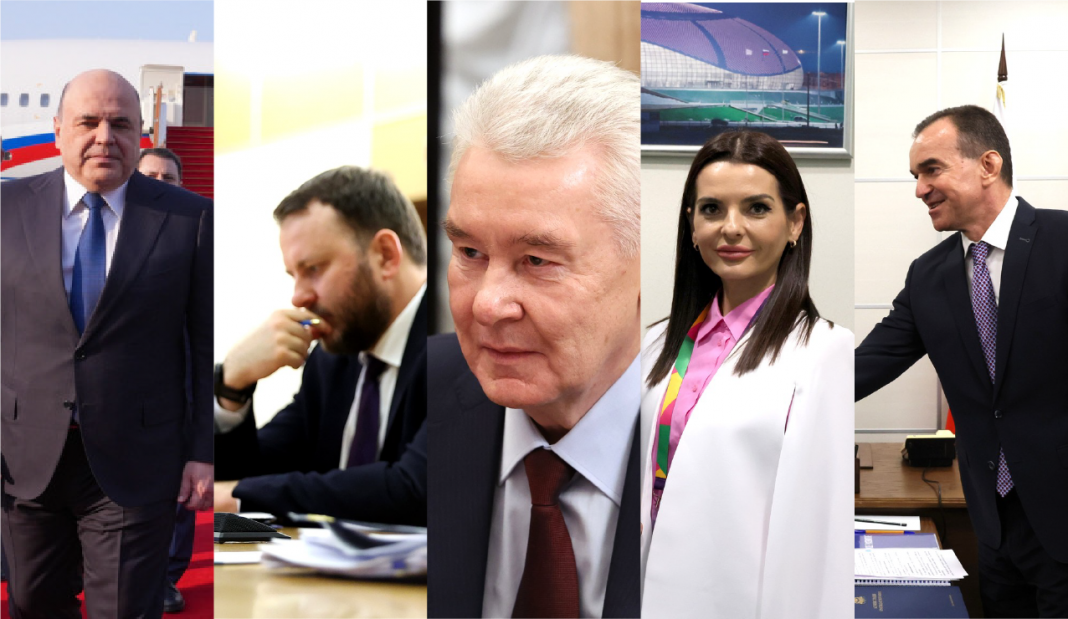This report describes the key events which significantly influenced Russia’s political, economic, and social processes.
Assessing the past week’s results, we determine the following trends:
- A week before the presidential elections, Vladimir Putin continues his pre-election tour of the regions and holds meetings with the leaders of individual regions. One of the last on the list of such pre-election meetings was Sergei Sobyanin, a fairly effective and popular leader of Moscow, who has done a lot for the city’s development. In the eyes of other Russian citizens, Moscow is presented as an exemplary city with serious achievements in urban planning, logistics and the introduction of new technological discoveries. It is worth admitting that Sobyanin succeeded in a lot (no matter how we feel about Russia as a whole). That is why, a little more than a week before the elections, Putin is trying to “join” the achievements or even lead them: Sobyanin, as it were, reports to Putin for the work done. Thus, the impression is that Sobyanin is only an executor of the “supreme will”. An understandable and expected move in preparing for the elections.
- Last week, Vladimir Putin made another pass towards the Minister of Agriculture, Dmitry Patrushev, who oversees the agro-industrial complex. Such a frequent appeal to Patrushev Jr. and successes in the Russian agro-industrial complex is not only an election move but also an announcement of the future promotion of Dmitry Patrushev. Most likely, we will see his rise in career terms. It is all the more important that the most powerful clan – Kovalchukov and Sechin – conflicts with the Patrushevs. That is, Putin is already creating a new configuration in which Russian “princes” will play an important role, and the basis for inter-elite conflict will be laid.
- Another important aspect is the renewed theme of creating our grain exchange instead of the Chicago Grain Exchange. Ascolta has constantly indicated that against the redistribution of the international market for agricultural products, it is extremely important for Russia to demonstrate its independence and create an export system under its control. If implemented, Putin’s idea to create a BRICS grain exchange could deal a serious blow to both the world grain market and the dollar as the most stable currency for international payments. This means that this topic is important for further study.
This digest covers the following topics, which were the most relevant for Russia between the 4th and the 10th of March:
1. Meeting of Vladimir Putin with Moscow Mayor Sergei Sobyanin;
2. Meeting of Vladimir Putin with representatives of the agro-industrial complex;
3. Meeting of Vladimir Putin with IAEA Director General Rafael Grossi;
4. Meeting on the development of the south of Russia and the Azov region;
5. Meeting of Vladimir Putin with participants of the World Youth Festival;
6. Meeting of Vladimir Putin with the head of Gagauzia Evgenia Gutsul;
7. Meeting with the Governor of the Krasnodar Territory Veniamin Kondratyev;
8. Visit of Mikhail Mishustin to Azerbaijan;
9. Speech by Dmitry Medvedev at the World Youth Forum.
This Content Is Only For Subscribers
- Meeting of Vladimir Putin with Moscow Mayor Sergei Sobyanin
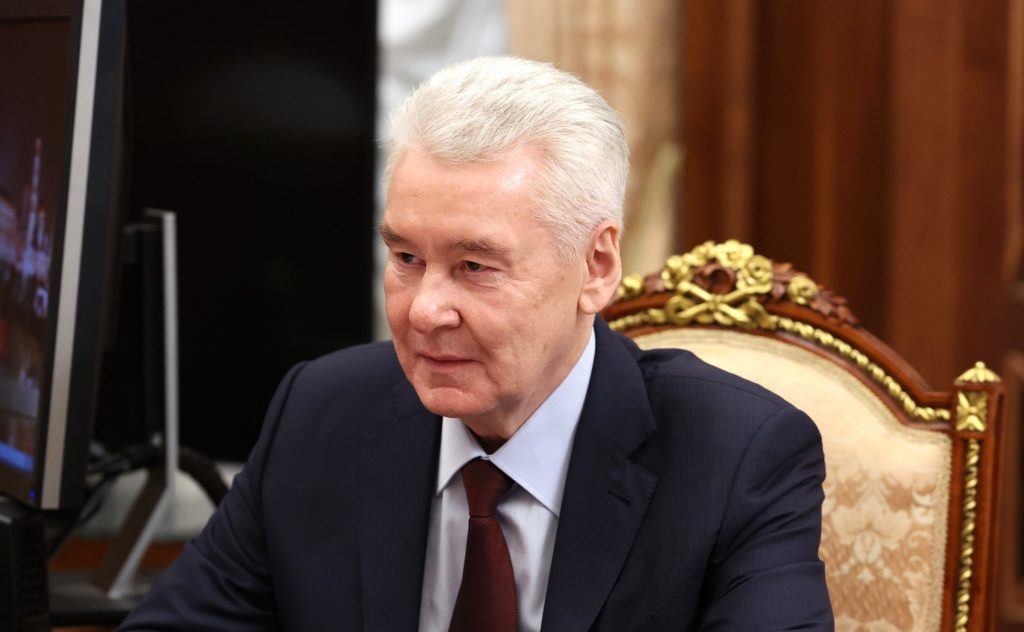
On Monday, March 4, Vladimir Putin and Moscow Mayor Sergei Sobyanin held a working meeting in the Kremlin. According to official data, the socio-economic situation in the capital was discussed, including the development of transport infrastructure, growth in production indicators, and investment activity.
Key theses:
- Sobyanin: “The results of 2023 in Moscow, I think, are one of the best in modern history. Good growth in all indicators, in production indicators that are important to us, such as pharmaceuticals, automotive, and microelectronics – from 25 to 40 per cent. Investments in real estate, commercial real estate, and housing construction continue to grow. We continue the renovation program.”
- Sobyanin: “The projects that you and I opened – the Bolshaya Koltsevaya line [a rapid transit line of the Moscow Metro], the high-speed diameter – are working very well. Today, we already transport one million 300 thousand people daily using this line. In terms of speed diameter – 400 thousand cars daily. Even if we look at the economic impact, for example, the federal budget and extra-budgetary funds have already received more than a trillion rubles of economic effect, budgetary effect because of the line.”
- Putin: “We understand that the threats they are trying to create are not empty, and we must keep this in mind. Of course, at the governmental, federal, and regional levels. Moscow is not simply classified as one of the regions; it is the capital. Here is the centre of science, education, and industry. Therefore, all this is very interconnected with the entire Russian economy. We, of course, must always remember this.”
Outcomes and outlook:
Sergei Sobyanin is a relatively effective and popular leader of Moscow who has done a lot for the city’s development. In the eyes of other Russian citizens, Moscow is shown as an exemplary city with profound achievements in urban planning, logistics and the introduction of new technological discoveries. It is worth admitting that Sobyanin succeeded a lot (no matter how we feel about Russia). That is why, a little more than a week before the elections, Putin is trying to “join” the achievements or even lead them: Sobyanin, as it were, reports to Putin for the work done. Thus, the impression is that Sobyanin is only an executor of the “supreme will”. An understandable and expected move in preparing for the elections.
- Meeting of Vladimir Putin with representatives of the agro-industrial complex
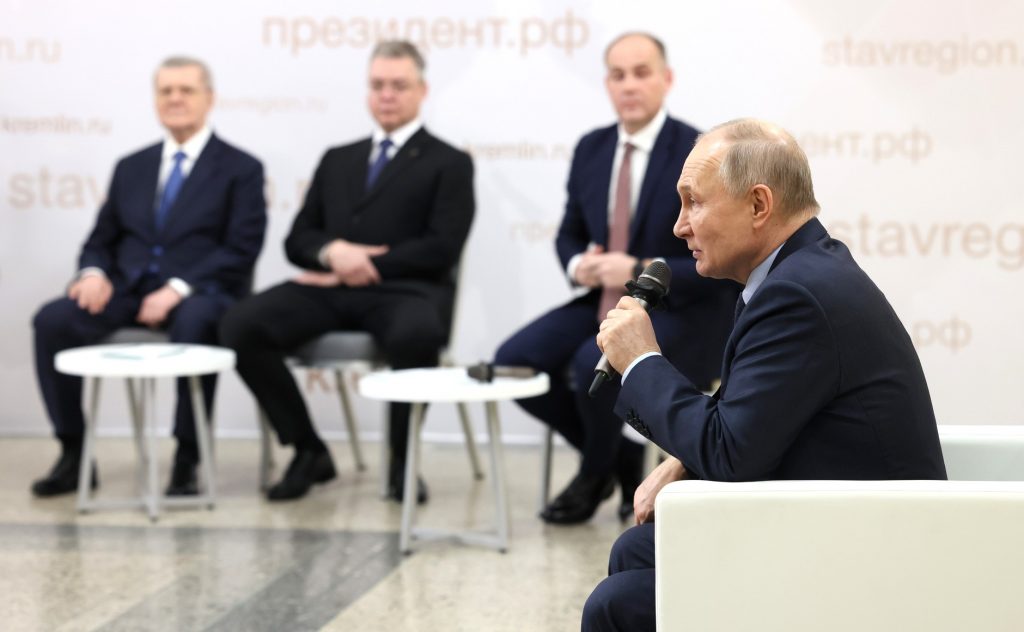
On Tuesday, March 5, Vladimir Putin visited the Stavropol Territory, where, in particular, he held a meeting with representatives of the country’s agro-industrial complex. During the meeting, the industry’s main problems were discussed, as well as the prospects for its development under the existing sanctions restrictions.
Key theses:
- Putin: “In the old days, the industry’s problems were somehow discussed more often. But the impression is that there is nothing to discuss: the industry is developing at such a good pace that this cannot but rejoice. But nevertheless, there are probably always questions, so we agreed with our colleagues, with the ministers, that here, on the Stavropol land, which is one of the centres of agricultural production in our country, we will talk about how the work is going and that we all together – and the Government, including regional authorities, needs to do to support you.”
- Putin: “Over the previous years, a lot has changed in the agricultural sector. To be honest, in 2000, we depended on almost all the main components and areas of supplying the country with food. Nowadays, such dependence practically does not exist.”
- Putin: “Last year, export revenues were $43.5 billion. You know, but nevertheless, since the cameras are working, I will say for our citizens: the increase was 30 times – not just some percentage, but export revenues increased 30 times. This seemed completely unrealistic just recently. No one would have believed it if they had said in 2000 that there would be 43.5 billion in export revenue. It would seem this is some kind of fantasy, but no, these are the realities today.”
- Putin: “Nevertheless, we have something to work on. The products of our agricultural enterprises are sent to approximately 150 countries around the world, despite any external difficulties created for us. And the market is expanding, perhaps even primarily not only because of the quantity of products produced but also because of their quality. Still, the quality of Russian food products remains very high—and not because our chemistry is poorly developed, no.”
- Putin: “My colleague spoke about carbon neutrality. Those who work in the field of ecology – just not those who work for foreign grants, but based on national interests – and those who work in the field of energy are well aware of the fact that everything, very much, In any case, from what was invented in same Europe, in the European Union, it was connected not only with attempts to preserve nature but with attempts to de-energise our competitive advantages in the field of energy – cheap energy.”
- Putin: “Of course, our railway is a basic condition for the movement of goods in general. Eighty-five per cent of our freight traffic goes by rail, and now there is still a lot of rolling stock at the Eastern range. This is understandable; everyone knows about it well, and we will develop it. But of course, development in the southern direction is no less important – this is the Black Sea direction, the Sea of Azov, and to the Baltic too.”
- Putin: “As for the stock exchange, you are absolutely right. All stock indices are formed in the States, Europe, or Paris. I don’t know how much grain the French produce. I think less than us, right? By tradition, stock indices are formed there. Of course, this is unfair because it also affects pricing.”
- Putin: “For our part, both I, the Minister, and our colleagues in the Government will do everything to implement the outlines that we talked about, those plans that, if implemented, will help you move forward.”
Outcomes and outlook:
Another pass towards the Minister of Agriculture, Dmitry Patrushev, who oversees the agro-industrial complex. Such a frequent appeal to Patrushev Jr. and successes in the Russian agro-industrial complex is not only an election move but also an announcement of the future promotion of Dmitry Patrushev. Most likely, we will see his rise in career terms. It is all the more critical that the most powerful clan – Kovalchukov and Sechin – conflicts with the Patrushevs. That is, Putin is already creating a new configuration in which Russian “princes” will play an important role, and the basis for inter-elite conflict will be laid.
- Meeting of Vladimir Putin with IAEA Director General Rafael Grossi
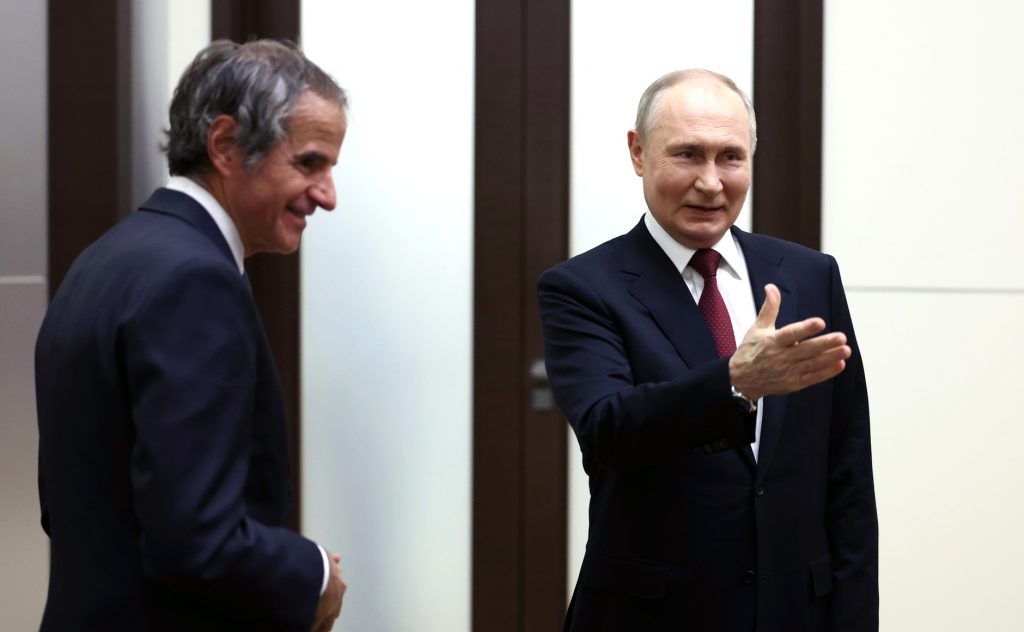
On Wednesday, March 6, Vladimir Putin met in Sochi with Rafael Grossi, the Director General of the International Atomic Energy Agency (IAEA), who arrived in Russia to discuss the situation around the Zaporizhzhia nuclear power plant, which is located in the occupied Energodar (Zaporizhzhia Oblast). It is noted that from the Russian side, the General Director of the State Atomic Energy Corporation Rosatom, Alexey Likhachev, also took part in the meeting.
Key theses:
- Putin: “We continue very active cooperation with the IAEA. Russia continues to cooperate in many areas, and we remain one of the undisputed leaders in this area in the world; we not only operate we actively develop nuclear energy and consider it an environmentally friendly form of energy; we do everything to improve the safety of nuclear facilities. We are building new power plants on modern principles: Kursk nuclear power plant-2 using fast neutrons. We are making small stations and developing a nuclear fleet. A small floating nuclear power plant was installed in the north. All this is in great demand not only in our country but also in demand by the economy and energy sector of the whole world. And we are ready to share our developments with all our interested partners.”
- Putin: “As you know, we are doing quite a lot of work in this sense in the international arena; with your help and support, we are implementing numerous projects in many countries of the world. Why did I say again about your help and support? Because this is very important, absolutely without any exaggeration, on a planetary scale; I mean ensuring safety and compliance with safety standards of nuclear energy worldwide.”
- Putin: “We are ready for further work in all these areas; we are grateful for your reciprocal steps to strengthen our joint work, and, of course, we are ready to discuss any issues that you consider relevant. I know that you have particularly sensitive and important issues on the agenda of our meeting today, and we, of course, are ready to discuss them and do everything to ensure security at any point where we are somehow involved in nuclear energy.”
- Grossi: “It’s very important for me to be here. We first talked in St. Petersburg a year and a half ago. This was an important meeting at that time. It seems to me that everything that has happened since then further demonstrates the timeliness of this conversation. I agree, these are significant times, there are challenges, and we will discuss these challenges.”
- Grossi: “There are sensitive issues regarding changes in global energy. Mr. Likhachev and I held a long morning meeting with our specialists and discussed various topics.”
- Grossi: “In my opinion, this conversation is extremely important. And I appreciate the opportunity and am ready to discuss all these topics with you. I am pleased to be in Russia. Thanks again”.
Outcomes and outlook:
Grossi’s arrival is essential in the sense that Russia today has become the most active player using “nuclear diplomacy” – spreading its influence in the world through the construction of nuclear power plants and their maintenance. This cannot remain under the radar of the IAEA. This is not the first time Grossi has had a relatively positive and complementary attitude towards Russia. This was previously evident in his assessments of the situation at the Zaporizhzhia NPP, which is under Russian control. Now, the topic of the Zaporizhzhia NPP has not lost its relevance. In general, Russia is quite actively using the IAEA and its influence on the organisation, which the Ukrainian leadership has repeatedly emphasised. In the current situation, neither the IAEA nor its head can be considered entirely objective and impartial in general assessments and comments regarding nuclear safety and nuclear energy.
- Meeting on the development of the south of Russia and the Azov region
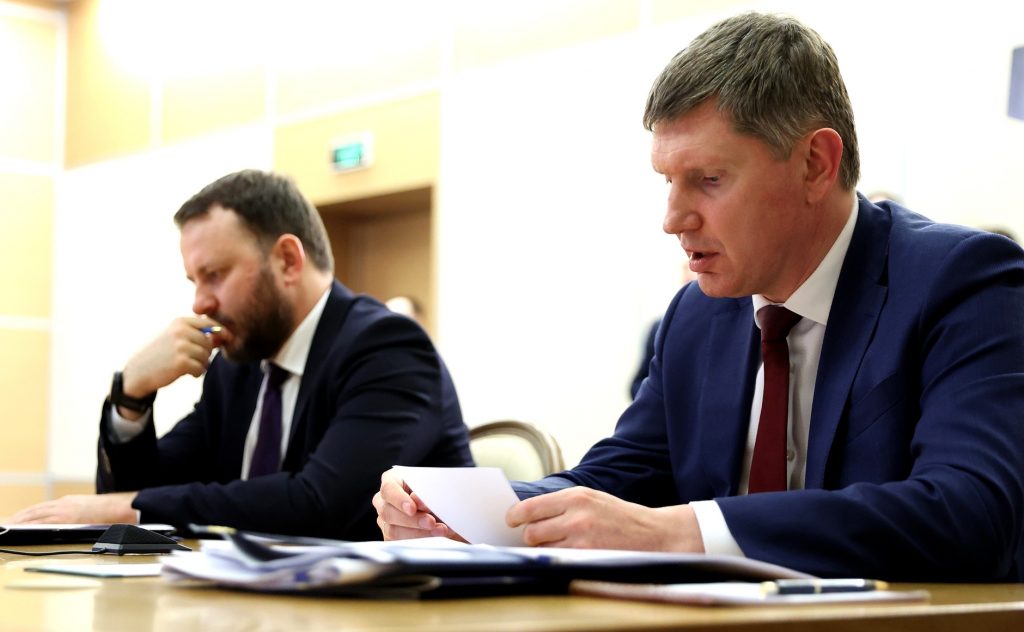
On Wednesday, March 6, while on a working visit to Sochi, Vladimir Putin held a meeting via videoconference on the development of southern Russia and the Azov region. The meeting was also attended by Deputy Prime Minister Marat Khusnullin, Presidential Aide Maxim Oreshkin, Minister of Natural Resources and Environment Alexander Kozlov, Minister of Economic Development Maxim Reshetnikov, Transport Minister Vitaly Savelyev, First Deputy Prime Minister Andrei Belousov, Presidential Aide Igor Levitin, Health Minister Mikhail Murashko, Minister of Finance Anton Siluanov, Minister of Construction and Housing and Communal Services Irek Faizullin, Head of the Republic of Adygea Murat Kumpilov, Governor of the Krasnodar Territory Veniamin Kondratyev, Governor of the Rostov Region Vasily Golubev, as well as the “heads” of the temporarily occupied territories of Ukraine.
Key theses:
• Putin: “We will talk about our regions such as the [annexed] Republic of Crimea, the city of Sevastopol, the Krasnodar Territory, the Rostov region and the Republic of Adygea, [the occupied territories of] the Donetsk and Lugansk People’s Republics, the Zaporizhzhia and Kherson regions. I want to note right away that all these subjects of the Federation have great development potential, primarily in the real sector of the economy, including metallurgy, mechanical engineering, and the agro-industrial complex.”
• Putin: “Here, in the southern direction, there are bottlenecks, unfortunately. First of all, I’m talking about the railway. These bottlenecks should also be on our radar now. The railway carries out the main load of cargo transportation, the railway operates with increased load. This includes growing business demand for transportation to southern ports. You and I know very well how many transhipment opportunities there are in the ports of the Black Sea basin alone and the possibilities of the railway for transporting goods to these ports. I believe they differ from each other four times, about four times. The railway can transport four times less cargo than ports can handle. Today I ask you to outline proposals for expanding the capacity of railways towards the Azov and Black Seas. “In particular, I propose to think about the possible separation of freight and passenger traffic in the southern direction.”
• Putin: “Let me emphasise: we need to make sure that as many of our citizens and families as possible can relax in Russia, choose a vacation they like: beach, ski, educational, and so on. Moreover, at affordable prices and with a high level of comfort.”
• Putin: “A separate issue is the further development of the so-called Azov ring, the highway around our already internal Azov Sea. We will definitely touch on this topic. The length of the Azov ring Marat Shakirzyanovich will tell you about this; how long? One thousand 400 kilometres? We are working on expanding the highway from two to four lanes.”
• Reshetnikov: “The Azov-Black Sea region is one of the key growth points on the map of Russia. Taking into account the “new” regions, this is 12 per cent of the population and 6 per cent of the production of goods and services. The economic structures here are balanced: a large transport and logistics hub, agriculture, which is associated with a third of the manufacturing industry, oil refining, mechanical engineering, metalworking and, of course, tourism are developed, as you mentioned.”
• Reshetnikov: “Preferential regimes that reduce business taxation help regional development. More than 1,200 projects are being implemented within Crimea and Sevastopol’s free economic zone. Last year alone, the business invested 40 billion rubles.”
• Reshetnikov: “The growth of agriculture in the southern regions is associated with strong state support within the framework of the agro-industrial complex program. In particular, with the support of these programs, orchards were planted in Crimea, greenhouse complexes were built, and winemaking is developing both in Crimea and the Krasnodar Territory, thanks to decisions taken to protect the domestic market from products from unfriendly countries.”
• Khusnullin: “I would like to note that in the nine regions in which we have four new territories, we have identified 12 main agglomerations, 28 major significant cities, and identified strongholds. Today, 10 million people live in these specific settlements alone, and 14 million tourists come a year; this is a huge territory with enormous development prospects.”
• Khusnullin: “We have identified 105 growth points, identified 66 sites for CRT, and linked these plans with the Strategy for Sustainable Development of the Azov Region until 2040, which Maxim Stanislavovich Oreshkin is preparing. We looked at all the available land, carried out a land analysis with Rosreestr, found thousands of hectares of unused land, and within the framework of this master plan, we propose to instruct us and the regions to work out the urban planning potential of these territories.”
• Khusnullin: “On your instructions, we are very actively involved in public transport. I want to say that in recent years we have reached almost 70 per cent in the regions as a whole, without new territories yet, to the standard state of public transport. Thanks to the decisions you made on financing, thanks to those tools, we set the goal of updating public transport to 85 per cent by 2030.”
• Kozlov: “The environmental situation in the nine regions of the Azov-Black Sea cluster is quite similar. The main directions that are needed for sustainable environmental development can be divided into three blocks. The first block is the development of the water sector. The second block is the elimination of accumulated harm. And the third is the rational use of our resources in these territories.”
• Kozlov: “The second direction is eliminating objects of accumulated harm. We are already carrying out similar work in the regions: in the Krasnodar Territory, 117 abandoned wells were liquidated; in the cities of Sudak, Belogorsk and Sevastopol, three unauthorised landfills were reclaimed; almost 600 thousand people lived next to them. By the end of the year, we will remove ten more landfills in Rostov-on-Don, Taganrog, Tsimlyansk, Donetsk, Novocherkassk, Krasnodar, Gelendzhik, Slavyansk-on-Kuban, Goryachiy Klyuch, Sevastopol. And thanks to this, the quality of life will improve for 2 million people.”
• Kozlov: “Third. Rational use of natural resources. The most forested region is the Krasnodar Territory, which accounts for almost half of the forest fund lands of the Azov-Black Sea macroregion, which is over 1 million hectares. The smallest number is in Zaporizhzhia – 47 thousand. The forest is mainly protective, that is, it performs water protection, sanitary, hygienic and health-improving functions.”
Key theses:
Putin focused on the most problematic regions. This is a message to both the annexed territories, the territories where hostilities occur, and the front-line areas. Another pass to Deputy Prime Minister Marat Khusnullin, who is part of the inner circle of the Russian President. Also unexpectedly active participation in the meeting was the Minister of Economic Development Maxim Reshetnikov, whom many Russian experts hastened to write off and began to talk about his possible resignation. In general, this is a message to problem regions that Moscow sees and knows their problems and is ready to solve them. On the eve of the elections – a technological move, mainly to stimulate regional elites and to create a “picture” for voters.
- Meeting of Vladimir Putin with participants of the World Youth Festival
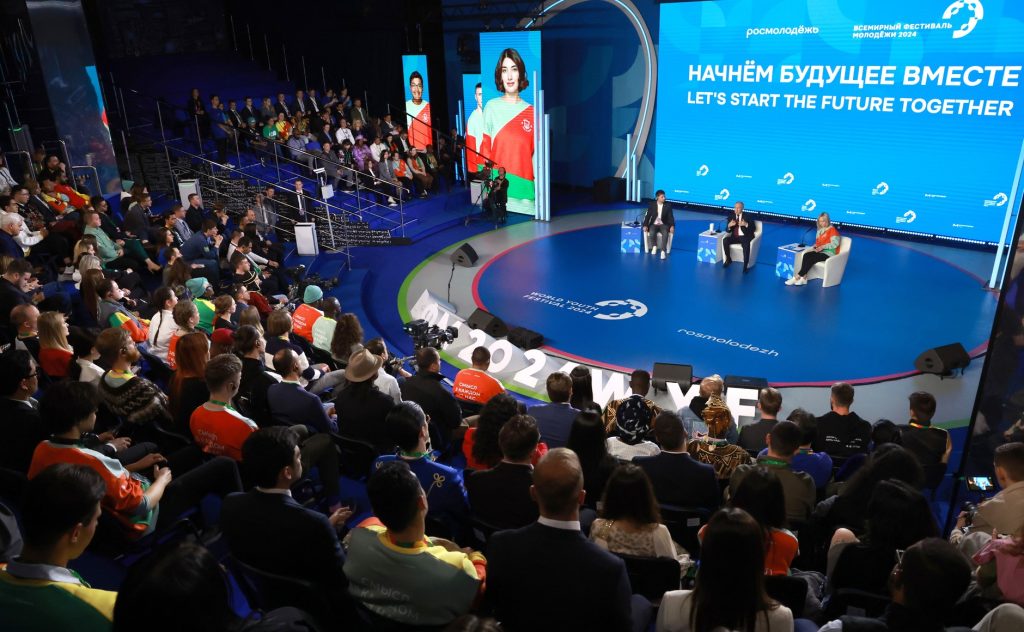
On Wednesday, 6 March, Vladimir Putin met with participants of the World Youth Festival, which was held at the Sirius educational cluster in Sochi. As part of his visit to Sirius, Putin visited several thematic exhibitions and gave a speech at the festival’s closing ceremony.
Key theses:
- Putin: “First, I want to say that we are delighted to see you all in Russia. Welcome. We are happy that such a wide representation came from almost 190 world countries from all continents. But what I want to emphasise. We don’t compete with anyone; we don’t want to prove anything to anyone. We’re just glad to see our friends. What is very important is that we are not organising this meeting and similar forums for some kind of window dressing, as we say. This is not some kind of promotional event; it is substantial. Its essence is to gather people who think approximately as we do because every person cannot think the same way, who adhere to approximately the same principles and values as we do, and who want to work together to achieve a positive result for themselves, for their loved ones, for their countries. We are open to this work.”
- Putin: “It is clear that there are problems in the economic, social, and security spheres. But suppose young people like you, involved in different fields of activity, meet, listen to, and hear each other. In that case, those who make decisions at the political level today will be more easily inclined towards conflict resolution options that lead not only to peace but also to stability for the future.”
- Putin: “The United States is a huge and unique country in its way. In just 300 years (by our standards, this is very little), thanks to the talent of the American people, it has turned into a superpower. This is an obvious fact. We know outstanding American politicians, businessmen, and cultural figures. This is all an immutable thing.”
- Putin: “You and I were allies in two world wars, in the fight against Nazism, against fascism. What’s happened lately? We know that after the war, after the alliance, the United States and the Soviet Union began to divide the world. They successfully divided it, and on this balance of power, they built international relations and created a modern system of international law. Then, the Soviet Union ceased to exist for several reasons, which I will not go into now. These are, first of all, internal reasons, but one superpower remains in the person of your country. How your elites took advantage of this monopoly on world domination is the question.”
- Putin: “I believe that the United States has failed to cope with this burden of responsibility that has fallen on its shoulders. They created a monopoly and began to strengthen it. I don’t mean the American people, but the ruling elites. But, strengthening their monopoly, they very quickly encountered the fact that the vast majority of countries in the world did not like it. And latently, gradually, everyone saw that resistance to this emerging world order was growing. Many people saw everything, at least by the way, including your allies. They just keep quiet; they are afraid to say an extra word because there is a lot of dependence in the economic sphere, in the media, well, there are a lot of elements of dependence. But believe me, I know what I’m talking about; even the allies don’t like it.”
- Putin: “Well, problems and disruptions began. First, the ruling elites of the United States decided that since they now had a monopoly on power in the world, they no longer needed the previous system of international relations that emerged as a result of the Second World War; it did not suit them. Because the balance in the world has changed, that’s all, and we need to start rebuilding the international legal order to suit ourselves. What do I mean? Events in Iraq, for example, were still done there without the sanctions of the UN Security Council, in Syria, in the former Yugoslavia. I won’t talk about the reasons now, but there were no decisions of the UN Security Council? There were no. The United States itself has let this genie out of the bottle. But if they are allowed, then why are other countries not allowed to protect their core interests similarly?
- Putin: “You know, no joke at all, then in North America, in the States, and Europe, many people, serious, literate, deep people, believe that to a large extent, the well-being of these countries is based on the exploitation of other peoples. Today’s prosperity is based on the exploitation of Africa to a large extent – on the exploitation of natural resources and human resources. They talk about it directly, honestly.”
- Putin: “You know, there was such a moment in the history of mankind, in the history of Europe. After the First World War, the greedy rulers, the then greedy rulers of France and Great Britain, created such financial conditions for Germany and imposed such indemnities and such conditions for repaying debts to, as they believed, the Entente states, that paying them off, these debts, was by definition impossible. And this was one of the reasons for Hitler’s rapid rise on the political stage. Because he told his people: “Look at what these bandits are doing because they have imposed conditions on us under which we will never, from generation to generation, be able to pay off the Germans and become a normal country. We have only one way – to fight for our interests by force.” This is not the only reason, but one of the serious reasons.”
- Putin: “You know, BRICS was born in Russia, so gradually all this happened. At one time, at one of the international events, within the framework of the same G8 in St. Petersburg, I invited our Chinese and Indian friends to meet the three of us. This is how the RIC association arose: Russia, India, and China. Then Brazil joined – BRIC, South Africa – it turned out to be BRICS. And today, this is such a powerful, severe association. This magnet attracts many countries of the world because, as our friend from the United States noted, these countries are indeed gaining momentum. I have already provided this data.”
- Putin: “Currently, the global GDP of the BRICS countries is greater than the GDP of the G7 countries, and this gap is increasing and will continue to increase. This is already a medical fact; nothing can be done about it, and even if someone wants to change this trend, it is no longer possible; it will continue to grow.”
Outcomes and outlook:
It is an absolutely ritual meeting, which in itself does not carry much burden. But it is interesting that Putin again decided to use anti-colonial rhetoric, accusing the West of neo-colonialism and declaring Russia an outpost in the fight against colonial dependence. This once again shows that Russia will try to present itself as the leader of a new movement against colonial reliance in the world. Soon, this ideological message will become the most important in Russia’s rhetoric on the international stage.
Another important aspect is the renewal of the topic of creating our grain exchange instead of the Chicago Grain Exchange. Ascolta has repeatedly predicted that against the background of the redistribution of the international market for agricultural products, it is essential for Russia to demonstrate its independence and create an export system under its control. If implemented, Putin’s idea to create a BRICS grain exchange could deal a serious blow to both the world grain market and the dollar as the most stable currency for international payments. This means that this topic is essential for further study.
- Meeting of Vladimir Putin with the head of Gagauzia Evgenia Gutsul
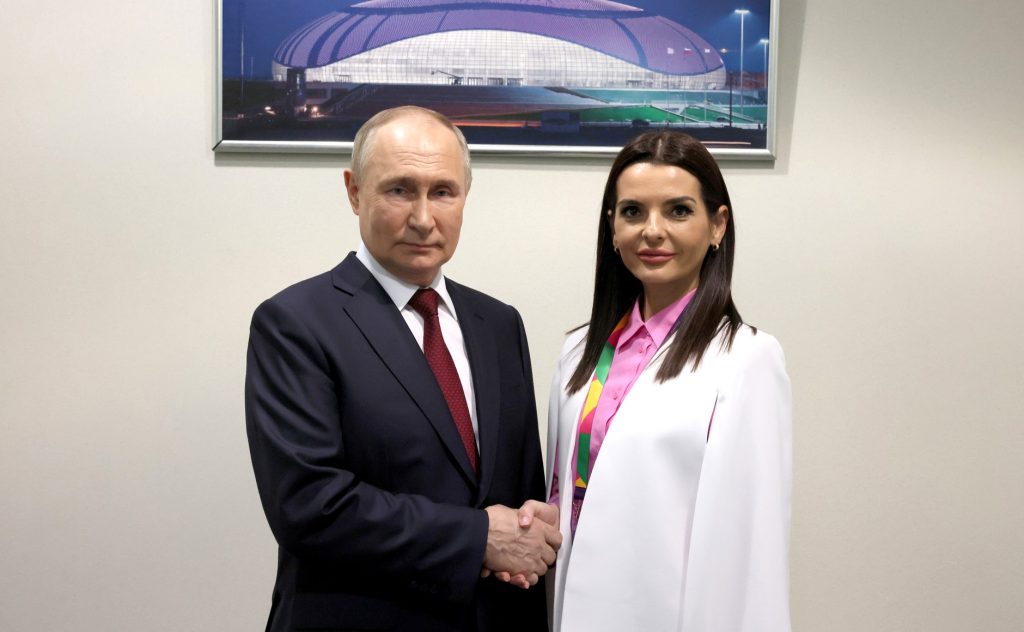
On Wednesday, March 6, on the sidelines of the World Youth Forum, held at the Sirius scientific cluster in Sochi, Vladimir Putin met with the head of Gagauzia (region of Moldova), Yevgenia Gutsul. The meeting was ceremonial, but it caused a great resonance in Moldova. According to official data, during the conversation, Evgenia Gutsul told Putin about the region’s situation and pointed out the growing escalation between Gagauzia and Chisinau.
Outcomes and outlook:
Russia has intensified its attempts to influence the situation in Moldova. If previously Russia’s leading partner in Moldova was the communists and ex-president Igor Dodon, now the emphasis is shifting towards younger and more radical representatives of the SHOR movement, led by fugitive businessman Ilan Shor, who lives mainly in Israel. Not long ago, Shor visited Moscow. Obviously, based on the results of Ilan Shor’s visit, the Presidential Administration and the Ministry of Foreign Affairs of the Russian Federation adopted the corresponding conclusions, and the emphasis shifted mainly to the Shor party, whose representative is Evgenia Gutsul, the Bashkan of Gagauzia, elected last year. In this situation, the question remains: how can Hutsul influence the situation? According to the Constitution of Moldova, citizens over 40 can participate in presidential elections. Neither Shor nor Hutsul meet this criterion. That is why the main thing is who Shor and the new pro-Russian opposition will nominate for the presidency.
Hutsul’s trip to Russia and her meeting with Putin are tentative steps. They are an attempt to see weaknesses in the current Moldovan authorities’ position, as well as an attempt to “draw fire upon oneself” and provoke the authorities into repression, which could, in turn, cause discontent among the wider population.
Also, Russia fears that official Chisinau will attempt to invade the self-proclaimed Transnistrian Moldavian Republic with the aim of liquidating it. In this way, Moscow demonstrates that Chisinau may face problems in the country’s south, in regions inhabited by Gagauzians. Repressive actions against the Gagauz will cause a reaction in Russia and Turkey, which maintains close ties with its former compatriots and considers the Gagauz part of the Turkish diaspora. Maia Sandu and her patrons abroad are not yet ready to quarrel with Erdogan.
- Meeting with the Governor of the Krasnodar Territory Veniamin Kondratyev
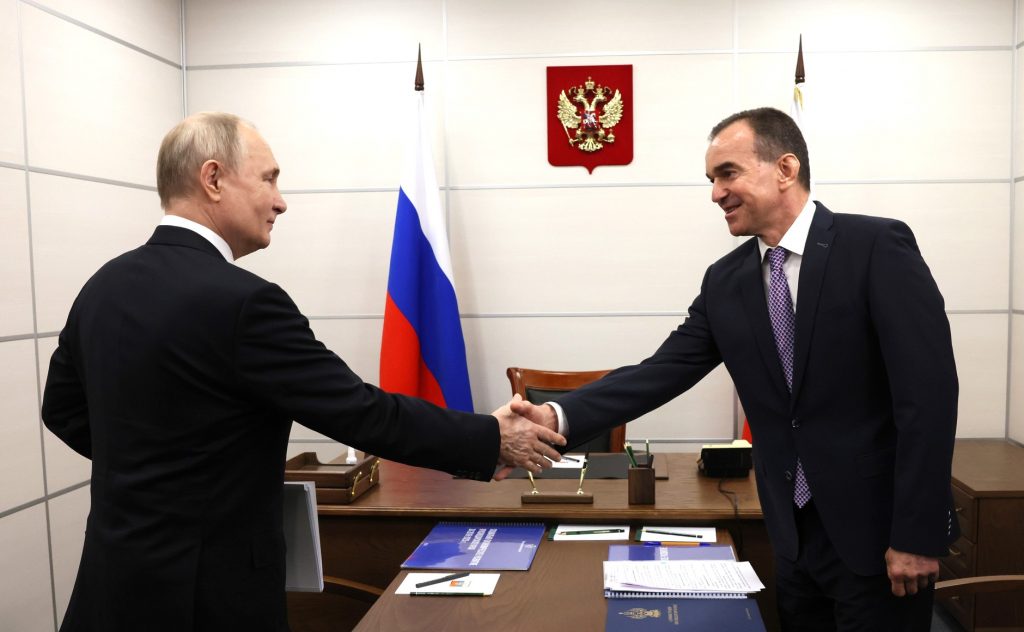
On Thursday, March 7, at the end of his visit to Sochi, Vladimir Putin held a working meeting with the Governor of the Krasnodar Territory, Veniamin Kondratyev. During the meeting, the current social and economic situation in the region and prospects for further development were discussed. This meeting became the next one on the list of Putin’s pre-election tour of the regions of Russia.
Key theses:
- Putin: “Generally, everything is steady with you. The region is developing, and the indicators are good – almost all the main indicators you are developing at a good pace. Unemployment in the country is at a record low, and yours is even lower than the national average. One of the significant indicators is population growth. In this regard, of course, problems and questions, primarily of a social nature, certainly arise. We need to think about increasing ambulance teams. Kindergartens, schools – the number of places should increase.”
- Kondratyev: “As for the economy itself, I will take the five years for comparison so that it is clear. Our gross regional product at the end of last year amounted to 4 trillion rubles; five years ago, it was two. That is, in five years, it has doubled. The budget’s own revenues are 500 billion. This is based on last year’s results, but in 2018 it was another 250 billion, that is, also doubled. The main races are in 2020, 2021, 2022 and 2023. It is important to understand here that today the country’s domestic market has become accessible to us, the regions, manufacturers, and businesses. Today, the opportunity to increase capacity and sell in their country is an important component of development, including business and business success, which they took advantage of. The main thing here is support measures, and they are colossal. Again, you voiced them in the Address to the Federal Assembly.”
- Kondratiev: “If you look at the economy in general, you know, in the famous film, it was said that Kuban is a granary, one region is a forge, and another region was a health resort. So today, we can confidently say that Kuban is a granary, a forge, and a health resort. Why? If we discuss the agro-industrial complex, this is also very important for us because we are convinced. For us, for Kuban, it is an honour to be the guarantor of Russia’s food security and, of course, the breadbasket of our country.”
- Kondratyev: “Last year’s harvest was decent, but, of course, not as record-breaking as we wanted. We have 14 million 400 thousand tons and 9 million 600 thousand tons – of wheat. The prospects for this year’s harvest – I’ll knock on the table again – inspire confidence that we will again approach record levels; this is fundamentally important for us. Why? Firstly, we have already sown 1 million 800 thousand hectares under winter crops and carried out the first fertilising, and everything is going quite well. But, again, our farmers don’t like to make guesses. And we have already started sowing spring crops, there are also 1 million 800 thousand hectares – this is a huge sown area. Everything goes within the calendar cycle of spring fieldwork, which allows us to conclude what we should get. Of course, the weather, but considering the weather, we also plan that everything will be fine here too, that is, a very decent harvest; as I say, this is significant.”
- Kondratyev: “As for schools, kindergartens. Here we can say what was and what has become. Over the past five years, 75 schools have been built in the region; if we take it from 2016, then 90 schools have been built. Over the past five years, 107 kindergartens have been built in the region, and if we take it from 2016, then 194 kindergartens have been built. Over the past five years, 160 sports complexes have been built, and if we take the entire period since 2016 (from the moment I became governor), 214 different sports complexes have been built; this is fundamentally important.”
Outcomes and outlook:
The Kremlin considers Veniamin Kondratiev one of the most effective governors and a contender for moving to important posts at the federal level. Therefore, Putin’s meeting with Kondratiev is very important in terms of forecasts regarding Russia’s future management architecture.
- Visit of Mikhail Mishustin to Azerbaijan;
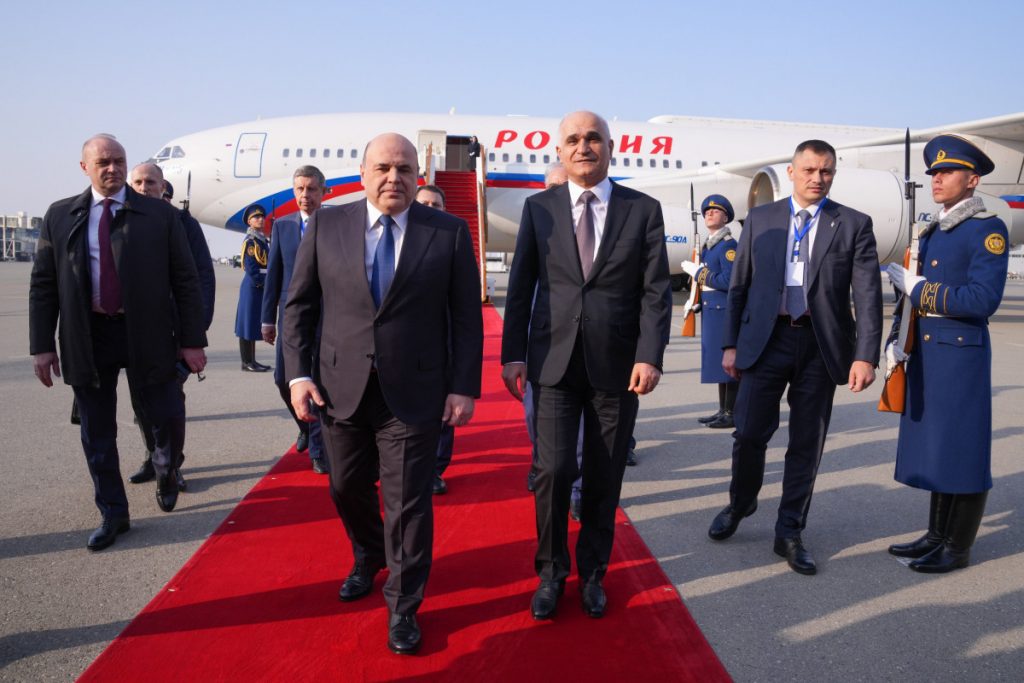
On Tuesday, March 5, Russian Prime Minister Mikhail Mishustin paid a working visit to Azerbaijan. During his visit, Mishustin visited the National Carpet Museum, laid wreaths at the tomb of Heydar Aliyev and the Monument to Fallen Heroes in Baku, held talks with Prime Minister of Azerbaijan Ali Asadov, and also met with President Ilham Aliyev.
Key theses of Mishustin’s meeting with Ali Asadov:
- Asadov: “Dear colleagues, as you know, early presidential elections were held in Azerbaijan on February 7 of this year. And the Azerbaijani people once again voted for peace, stability and development. According to the election results, Ilham Heydarovich Aliyev won with 92.12% of the votes. Mr. President approved the new Government of Azerbaijan and set new domestic and foreign policy tasks for us.”
- Asadov: “The development of relations with friendly countries, including the Russian Federation, remains one of the important priorities of Azerbaijan’s foreign policy. We aim to strengthen further and expand good neighborly relations, mutually beneficial cooperation and strategic partnership with Russia. We are also committed to continuing our cooperation within the CIS.”
- Asadov: “Thanks to the political will and joint efforts of the presidents of Azerbaijan and Russia, Ilham Heydarovich Aliyev and Vladimir Vladimirovich Putin, our interaction today has acquired the character of a strategic partnership. February 22 marked exactly two years since the presidents signed the Declaration on Allied Cooperation, which took our ties to a qualitatively new level.”
- Asadov: “Today, following our meeting, documents will be signed on the development of checkpoints and road infrastructure on the border, as well as in the field of tourism and culture. All these documents are an important addition to our solid legal framework, which currently includes more than 260 signed documents.”
- Asadov: “In recent years, we have made serious progress in many areas of cooperation. These include investment interaction, industrial cooperation, cooperation in transport, energy, agriculture, cultural, humanitarian, and many other areas. I hope that today, we will talk about all this in detail and reach a mutual understanding on specific ways to advance in the areas that interest us.”
- Mishustin: “We are in constant contact with you, dear Ali Idayatovich. In December, we met at the Council of CIS Heads of Government in Moscow, where we discussed, among other things, our bilateral agenda. And before that, we participated in CIS events together in Sochi.”
- Mishustin: “I want to say that we are sincerely interested in strengthening friendship and cooperation with friendly Azerbaijan. That’s how we work. A reliable basis for this is the Declaration on Allied Cooperation between Russia and Azerbaijan, signed in Moscow in February 2022.”
- Mishustin: “You mentioned the figure for mutual trade turnover last year – it was 370 billion rubles or 7 billion manats. We see significant potential for developing cooperation in several areas. We have already talked about them in detail today. This includes energy, industry, shipbuilding, agriculture, high technology, and innovation. There is a huge field for joint projects and joint investments.”
- Mishustin: “We traditionally pay special attention to the cultural and humanitarian sphere. Here, Mr. Ambassador does a lot. And in Baku, in particular, branches of Lomonosov Moscow State University and Sechenov First Moscow State Medical University operate successfully.”
Key theses of Mishustin’s meeting with Ilham Aliyev:
- Aliyev: “We finished the year successfully. Bilateral interaction is developing as planned. We have been cooperating within the framework of allied cooperation for just over two years, and all the tasks set to strengthen cooperation are being successfully accomplished.”
- Aliyev: “As for the trade and economic sphere, I also think the results are quite satisfactory – an increase of more than 17%. I think this is a good indicator. We are already approaching the $4.5 billion mark.”
- Aliyev: “Naturally, this is not the limit, and I am confident that within the framework of the agreements that were reached during the visit, next year, and at the end of this year, we will see an even greater increase in mutual trade.”
- Aliyev: “I looked at the materials on agriculture before your visit. We complement each other. What we need, we purchase from you, and vice versa. We are also pleased that the significant increase in the supply of Azerbaijani agricultural products to the Russian market, as we agreed, continues successfully.”
- Aliyev: “On Azerbaijani territory, and Russian territory as well, infrastructure exists, as we know. The only thing is that it needs modernisation so that it is possible to transport volumes of cargo greater than planned.”
- Mishustin: “The respected head of the Government of Azerbaijan, Ali Idayatovich Asadov, and I are in constant contact and hold meetings regularly. We met in Moscow in December at the Commonwealth of Independent States forum. And before that, we met in Sochi. I recently visited Azerbaijan. “I want to assure you that absolutely all decisions made by the leaders of our states are under constant control and are being implemented by our governments.”
- Mishustin: “We discussed a broad bilateral agenda yesterday. You mentioned several areas. Yes, there are more and more projects in the industry. We are thinking, in particular, about a joint project in the field of transport engineering. There is also a promising area for large mutual technological innovation projects. We are working on agriculture – you spoke about mutual complementarity. We also have several issues regarding pharmaceuticals, and yesterday, we agreed to strengthen work here.”
- Mishustin: “I would also like to say that the transport capacity at our checkpoints has increased fivefold. This is also a large systematic work, which, together with our respected colleagues from Azerbaijan, is being carried out by our Ministry of Transport. And we continue all relevant logistics projects here. You spoke about the North-South corridor. Indeed, 30 million tons is a serious volume. And, of course, a lot remains to be done to ensure no bottlenecks are left at the sites.”
- Mishustin: “On cultural exchanges, on issues related to interaction in this area, there are a lot of projects and ideas here. We have agreed to expand our contacts, including with the Ministry of Culture of Azerbaijan, and are working on a “road map” for holding a large number of events. And of course, we will be glad to see Azerbaijan’s respected cultural figures and artists in Russia, in Moscow.”
Outcomes and outlook:
Mishustin’s visit to Baku should be viewed through the prism of the final consolidation of previously reached political agreements between Russia and Azerbaijan. Over the past two years, trade and economic relations between the two states have strengthened despite sanctions and restrictions. Regular accusations by European leaders against official Baku, including regarding trade between Baku and Moscow in energy resources and mediation efforts to transport Russian gas to Europe, clearly did not arise out of nowhere. Recently, Azerbaijan has only more openly begun to demonstrate that it will not submit to Western pressure and intends to develop relations with Russia further.
At the same time, Russia must finally agree on positions with Azerbaijan on oil production and gas transportation and finalise the conditions and rules for joint activities in the Caspian Sea. In this context, it is essential to note that almost immediately after Mishustin visited Baku, the President of Kazakhstan, Kassym-Jomart Tokayev, also visited the capital of Azerbaijan. Such involvement of the leading players in the Caspian region may indicate that intensive work is underway to minimise British influence on the region’s economy.
- Speech by Dmitry Medvedev at the World Youth Forum
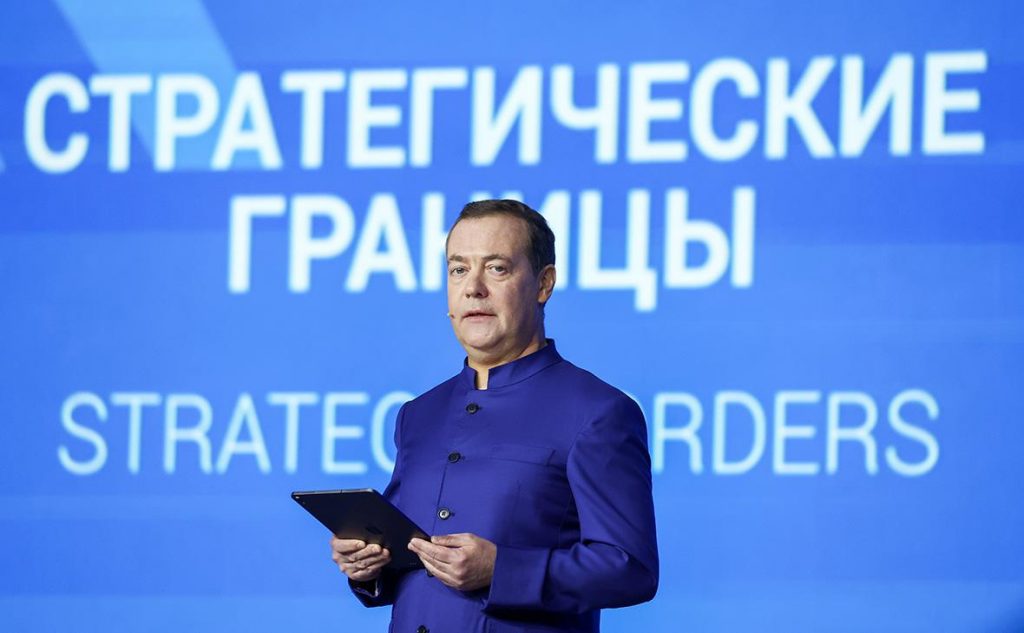
On Monday, March 5, Dmitry Medvedev, Deputy Chairman of the Security Council of the Russian Federation, lectured the World Youth Festival participants on the “geographical” and “strategic” borders of world states. The most discussed part of Medvedev’s speech was a visualisation in the form of a map showing Ukraine’s territory divided between Russia, Poland, and Romania. Also, in his usual manner, Medvedev once again repeated the theses about “one country” and “one nation.”
Key theses:
- “Our president spoke precisely and succinctly about our borders: Russia’s borders do not end anywhere.” True, this thesis, as it turned out, allows for a multifaceted interpretation, including in terms of terminology itself. The first is the well-known “stable and officially recognised demarcation and delimitation lines,” while the second researchers prefer “not to mention again.”
- “These boundaries are not limited to the physical size of countries but directly depend on how far political power extends: the more powerful the state, the further its strategic frontiers extend beyond state borders and the larger the strategic space on which such a country exerts political influence, economic impact, and socio-cultural impact.”
- “Our geostrategic space has been inseparable since the times of the ancient Russian state. We have a common language, religion, and ideas about the everyday and customary way of life. Therefore, this is an integral part of a sacred space for each of us, no matter how much the “wild Kyiv Nazis and their masters” strive to tear this space apart. The current “Bandera Ukraine” serves as a “ram” for an anti-Russian attack initiated by Washington, which is trying to “extend its strategic borders to almost all regions of the world. Under the pretext of spreading democracy, the United States is inciting wars all over the planet; the goal is transparent: moneymaking, that’s all.”
Outcomes and outlook:
In his manner, Dmitry Medvedev decided to play the role of a “hawk”. His speech to young people corresponded with Putin’s speech and aimed to radicalise Russia’s position in the modern world. Medvedev’s status as a “former president of the Russian Federation” and “a member of the president’s team” was important for many. That is why Medvedev is now announcing theses that Putin cannot afford.

